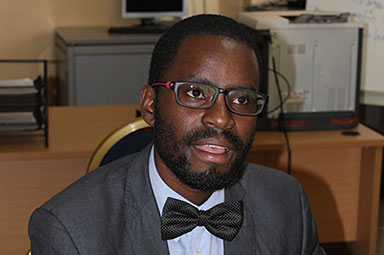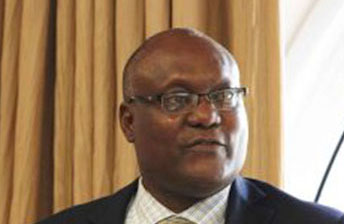The BID Initiative Story
Profile
Dr. Francis Dien Mwansa
“The partnership with BID has been unique in that every step of the way, we were involved—we were part of the decision-making and BID ensured we were on board. This transparency is not something we see with all partners and programs, but it was important because we [the MOH and BID] were able to tell the same story, and it makes taking the next steps together easier.”

In July 2017, the Zambia Ministry of Health (MOH) and the BID Initiative hosted a showcase event to demonstrate the data quality and use interventions that had been collaboratively developed in an iterative process since 2014. During this event, a health worker from Monze in Southern Province shared his experience with data use tools, such as the Zambia Electronic Immunization Registry (ZEIR).
Dr. Francis Dien Mwansa, Zambia’s National Expanded Programme on Immunization (EPI) Manager, also took to the front of the room to demonstrate ZEIR’s functions to the audience. After the demonstration, a participant from a partner organization raised her hand and asked, “I keep hearing you say ‘my, my.’ Is this an MOH system or is it BID’s? Please explain, we’re getting confused.”
Dr. Mwansa smiled and said, “This is my system,” touching his chest for emphasis. “And I am from MOH.”
Keeping step with the Ministry of Health
This confidence and ownership exemplifies how far the BID Initiative and MOH have come in developing tools that will address data accessibility, quality, and use challenges in the health service, particularly in immunization.
The Ministry of Health has a strong connection to the data quality and use interventions because of the dynamic way in which the ministry partnered with the BID Initiative. Instead of dictating interventions and strategies for implementation, BID worked hand-in-hand with the MOH and User Advisory Groups to identify and then execute an adaptable package of solutions.
Dr. Mwansa explains: “The partnership with BID has been unique in that every step of the way, we were involved—we were part of the decision-making and BID ensured we were on board. This transparency is not something we see with all partners and programs, but it was important because we [the MOH and BID] were able to tell the same story, and it makes taking the next steps together easier.”
The development process of the electronic immunization registry (EIR) took longer than expected and was met with several challenges along the way, but both MOH and BID rose to overcome these obstacles.
In particular, Dr. Mwansa underscores the importance of achieving data integrity. Inaccurate data can present health risks for patients and a liability for health facilities, leading to, among other issues, data loss and inaccurate or incomplete care.
“We haven’t lost sight of what we want to achieve—we needed a tool that can show us credible data. For us the most important thing is the integrity of the data, and interventions based on where the data is being generated,” says Dr. Mwansa. “This has been our driver and we have not lost that vision. We are not fancied by beautiful products and dashboards, we are focused on clean data at the point of collection, and that’s what we have with [ZEIR] right now.”
Of course, the downside of a long development process that also required changing system platforms is that it has left less time for users across the health system to experience the tool. Rollout of data quality and use interventions in Southern Province began in November 2016. ZEIR was later added to this package of solutions in May 2017.
To ensure that Southern Province has more time to use the interventions and data to improve immunization service delivery, the MOH and the BID Initiative are actively engaged with donors such as Gavi, the Vaccine Alliance, to achieve ongoing support for long-term success and sustainability. But before Zambia can consider scaling ZEIR, it will need to demonstrate the benefits of using an EIR over paper registries. To do so, ZEIR will need to be implemented beyond Southern Province.
“With our clear vision, we can begin mobilizing what we need to move beyond Southern Province,” says Dr. Mwansa.
Empowering data use champions
Working closely with a partner organization is not new to the MOH or to Dr. Mwansa, but there is a key difference that he notes when reflecting on the tools produced by this particular partnership. It is also one of the initiative’s greatest successes, in his eyes.
“The change management component has been the biggest positive. Everyone [in the health facilities and MOH] agrees that our involvement in the User Advisory Group, which was a large part of how change management worked, helped us succeed. This is because it allowed the health workers to provide input that would be taken on board and used. It empowered the health workers with knowledge and decision-making abilities. They saw they had the power or influence to change things, which was important. The tool is user-based, and having the buy-in from the users built trust in the tools we were developing, and it’s something unique to BID so far.”




